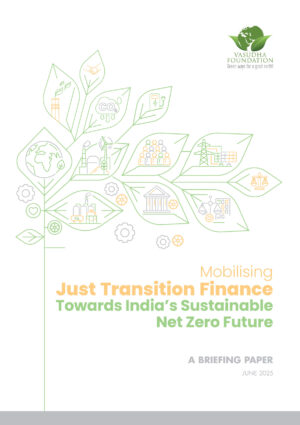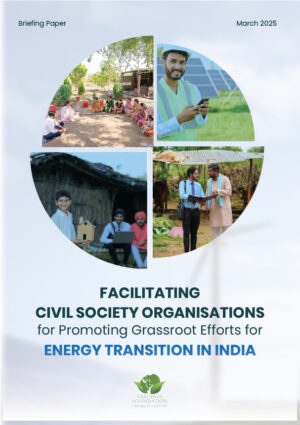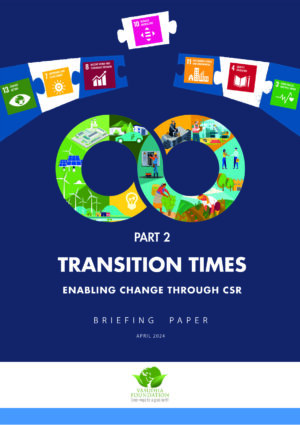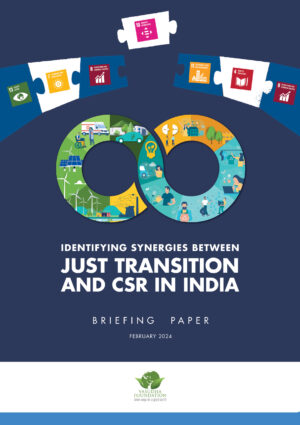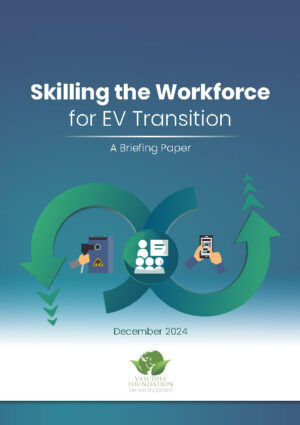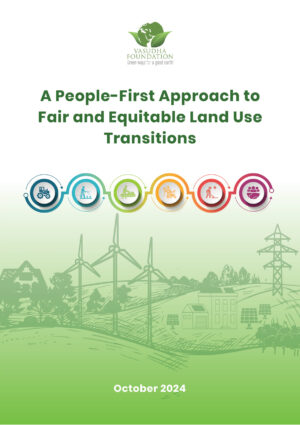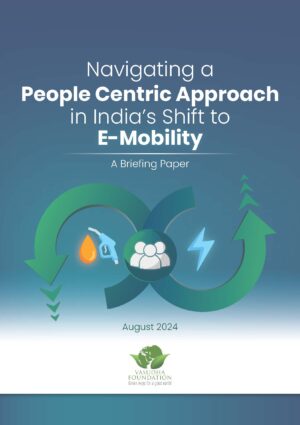Vasudha Foundation, with support from the India Climate Collaborative, is working to mainstream the discourse on equitable and inclusive energy transitions in India, aiming to build a collective understanding of the Just Transition Landscape in India.
As part of this initiative, Vasudha Foundation is developing and disseminating a series of knowledge products that explore various themes related to the energy transition. Vasudha Foundation is also actively engaging with on stakeholder and facilitating knowledge exchange among a wide network of actors – including sectoral experts, CSOs, think tanks, industry leaders, philanthropies and CSR bodies – to foster meaningful dialogue and collaboration.
Key Publications
Transition Chronicles captures the people’s side of India’s energy transition, spotlighting the financial, social, and institutional mechanisms needed to make it equitable and inclusive. Through sectoral insights on MSMEs, ICE to EV transition, CSR frameworks, financial mechanisms and the role of civil society, it explores how to create supportive ecosystems for communities, workers, and small enterprises to thrive as India transitions to net-zero by 2070. The publication brings forth stories of resilience and innovation, underscoring Vasudha Foundation’s commitment to placing people and planet at the heart of climate action.
Financing people-centric just energy transition for a country like India requires all hands on deck. Both domestic and international financial flows need to be augmented to fuel India’s journey towards its 2070 goals. Apart from enhancing standalone investments, this will have to be approached in a collaborative and a ‘whole of an ecosystem’ manner where financial stakeholders collaborate with each other to de-risk and invest. Moreover, such partnerships must harness community voices, and be based on strong monitoring, evaluation and learning frameworks to guide such investments.
Globally, civil society organisations (CSOs), often abbreviated as NGOs (Non-government organisations), are known to play a crucial role in bringing about a positive societal change. Spanning different geographies and sectors, such organisations are critical in building consensus across diverse actors on the vision and roadmap for the future, particularly in matters of public interest and social welfare. CSOs act as a bridge between social, economic and political actors, including governments, businesses and communities. They enable evidence-based decision making by incorporating grassroots perspectives and a knowledge of community needs and wants into decision-making platforms.
This piece is the 2nd part of the ‘CSR & Just Transition’ knowledge series which captures practical learnings and success stories from JT-aligned CSR interventions in the form of case studies and answers to some key preliminary questions for CSRs regarding JT. As a powerful tool, CSR enables companies to address and mitigate transitional risks by taking action for the betterment of workers, communities and even consumers. Many companies’ existing CSR efforts might already be having similarities or overlaps with Just Transition elements. However, there is a need to direct these efforts towards the specific regions and communities in need of JT support.
This paper delves into the concepts and principles of a just and equitable energy transition and highlights its significance for businesses in India. We believe that businesses, through their Corporate Social Responsibility (CSR) initiatives, can play a vital role in ensuring a smooth and equitable transition towards a sustainable future.
This paper analyses emerging skill gaps and requirements in the ICE-to-EV transition, examines the current skilling ecosystem, and incorporates insights from industry leaders like Hero Electric and Ready Assist, who are undertaking flagship training programs for service technicians. Through this comprehensive approach, the paper seeks to contribute to the development of effective strategies for building a future-ready automotive workforce in India.
This paper dwells on certain key sectors where land use change can be expected or is required, namely- renewable energy expansion, agriculture and nature-based solutions. Through international and national case examples of inclusive and fair practices in these key sectors, the paper explores possible approaches for facilitating the transition in these sectors while minimizing the social, economic and environmental impacts on people and ecosystems.
This briefing paper serves as a foundational step towards understanding and implementing a People-centric Approach specifically for the road transport sector in India. Its core focus lies in identifying the people-centric nodes that will be significantly impacted. Further, it will define the indicators that should guide a transition in the road transport sector and explore strategies that need to be considered for facilitating a fair and inclusive transition for all, leaving no one behind.




